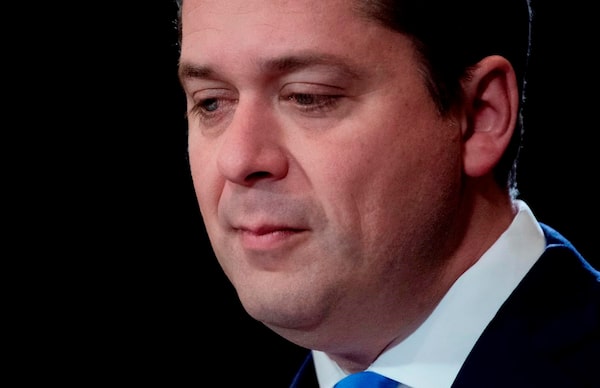
History tells us Mr. Scheer faced an uphill climb.The Canadian Press
Bob Plamondon is the author of Blue Thunder: The Truth about Conservatives from Macdonald to Harper and Full Circle: Death and Resurrection in Canadian Conservative Politics.
Most Conservative MPs have said Andrew Scheer performed well on the campaign trail. Yet over the course of the campaign, his “unfavourable” ratings steadily rose. Why this happened and whether he will be given a second chance are the subjects of much speculation.
History tells us Mr. Scheer faced an uphill climb. That only two majority governments were defeated after a change in power likely kept many high-profile Tories – Jason Kenney, Rona Ambrose, John Baird, Peter MacKay and Brad Wall – out of the Conservative leadership race in 2017.
But by the outset of the 2019 campaign, a succession of blunders by Prime Minister Justin Trudeau dropped his approval rating below U.S. President Donald Trump’s. If governments defeat themselves, then Mr. Trudeau had accelerated the process. It was Mr. Scheer’s campaign to win. So why did he lose?
When Brian Mulroney was elected Tory leader in 1983, he was dissed on stage by the party’s interim leader, Erik Nielsen. Mr. Mulroney made Mr. Nielsen his deputy leader on the spot and unity prevailed. When Mr. Scheer became Leader, he deprived his leadership rival of oxygen. Maxime Bernier returned the favour by forming his own ill-fated party.
Mr. Scheer then tried to outflank Mr. Bernier on the right by proposing to gut foreign aid by 25 per cent along with a host of other cuts. To progressives in the conservative universe, this was short-sighted and mean-spirited.
Given Mr. Scheer’s deep social-conservative views, expanding the Conservative base was a near-impossible task. On the campaign trail, he was on his heels when it came to same-sex marriage and a woman’s right to choose. This left him out of touch with modern Quebec and much of urban Canada.
Mr. Scheer had hoped to cozy up to Quebec’s popular Premier, François Legault, but an alliance was never sealed because of the Conservative proposal for a national energy corridor. While good for the West, that’s not where Mr. Scheer needed more votes. It was also perhaps Mr. Scheer’s bad luck that Quebec’s new secularism law gave the Bloc Québécois a new lease on life.
Conservatives had good reason to tire of Mr. Trudeau’s passion for celebrity, his penchant for identity politics and his never-ending tour as Canada’s apologist-in-chief. At times, Mr. Scheer exploited these weaknesses, such as when he linked a proposal for free entry to Canadian museums to his desire to reassert national pride. But otherwise, Mr. Scheer’s platform lacked inspiration and was cluttered with a grab bag of 184 checklisted promises.
Perhaps the biggest reason why the Tories failed to grow beyond their base were policies on climate change that resembled something you might expect from the Flat Earth Society.
Ironically, the most conservative and market-oriented policy to address climate change – a carbon tax – had already been snatched by the Liberal government. This was the same straightforward policy that was producing results in British Columbia and that had been endorsed by many conservative thinkers, including Preston Manning.
Even major oil-producing companies were onside with a carbon tax. Mr. Scheer would have had to drag his party kicking and screaming to this end, but it would have shown he was serious about winning. In contrast to the other parties, Mr. Scheer could have proposed fundamental supports to the energy-producing provinces that would be negatively affected. That’s what keeps countries united.
The last time the Tories went through a meaningful leadership review was after Joe Clark lost government in 1980. Despite winning 66 per cent in a party vote, Mr. Clark would have faced a revolt in caucus had he not called a leadership convention.
Likewise, Mr. Scheer’s fate largely rests with the Conservative caucus and defeated MPs such as Lisa Raitt, many of whom share their Leader’s sensibilities. Nonetheless, they need to be convinced that Mr. Scheer – more so than the above-mentioned Tory heavyweights – can win 50 more seats in places such as Quebec, Toronto and Atlantic Canada. That task might be even tougher if Mr. Trudeau steps aside and the Liberals put Catherine McKenna, Mark Carney or Chrystia Freeland on the ballot.
While Mr. Scheer may never become charismatic, he might succeed if he can rebuild bridges across the conservative universe, adopts mainstream policies that don’t reek of ideology and are relevant in all parts of Canada, addresses climate change with substantive policies and somehow reconciles his social-conservative views in a way Canadians can accept. If he can’t do these things, he should step aside.
If all Conservatives can do is hold their base, they will stay in opposition as they did for most of the 20th century. If that happens, then Canada loses.